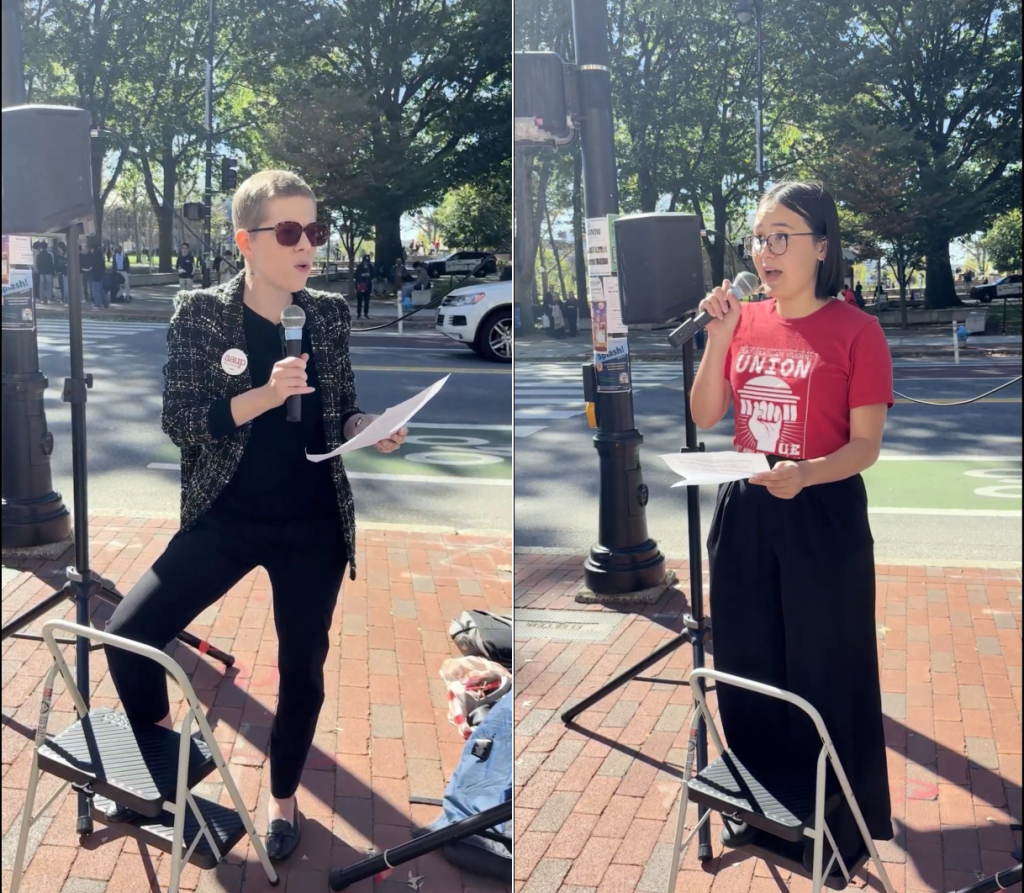[[{“value”:”

By: Frederick Reiber
CAMBRIDGE, MA – Massachusetts Institute of Technology (MIT)’s students, workers, and union comrades gathered outside of the university’s Lobby 7 on Friday, October 10th to protest and celebrate MIT rejecting the Trump administration’s compact.
Earlier this month, the White House sent offers to nine universities in what the administration titled “Compact for Academic Excellence in Higher Education.” Contained within these agreements were a number of stipulations—including commitments to accept the government’s priorities on admissions, women’s sports, free speech, student discipline and college affordability—exchanged for better access to federal research funding.
Following calls from the graduate worker union, professors, and numerous other student-led groups, MIT president Sally Kornbluth rejected the compact. She cited the numerous messages she had received asking for the compact’s rejection. In doing so the university becomes the first to reject the president’s proposal and the only such university at the time of writing.
Trump’s Continued Attacks on Higher Education
Trump’s proposal follows numerous attacks and challenges to higher education. The administration has paused federal funding of many top research universities, signed several executive orders targeting colleges, and attacked international students’ rights. These have emptied out entire neighborhoods in areas like Allston-Brighton as international student enrollment dropped precipitously this semester, and while the compact may be seen as an attempt to change course, academic leaders were quick to point out its true intent. Ariel White, vice president of the American Association of University Professors (AAUP) at MIT, said:
This wasn’t an invitation letter, it was a ransom note… the goal is to leave universities powerless and at the whim of the federal government.
Other academic leaders agreed. MIT Graduate Student Union (GSU) – UE 256 president Lauren Chua called the proposal “a thinly veiled attempt to divide us, to make us turn against each other, and to weaken the very communities that make our university thrive.”
Chua couldn’t be more right, as the compact seeks to enforce harmful gender definitions, denying transgender students recognition and rolling back university protections, all masked under the language of “equality.” Other stipulations include forcing universities to be more accepting of conservative lines of thought, potentially overruling scientific consensus in academic research. The compact also bans colleges from using sex, ethnicity, gender, or political orientations, continuing the overturning of decades of academic work that finds strong connections between affirmative-action like policies and increasing opportunity for those with less money, or those who continue to face systemic racism. As Jade Personna, the speaker for the MIT Black Student Union, argued: “the battle is decades old and the Black Student Union has been fighting it since our inception.”
U.S. conservatives will continue their attacks on academic and intellectual freedom. That is part of a larger ideological project only furthered by the practical program of Project 2025. Long seen as bastions of “deceit and lies,” higher education has long been seen by conservatives as a threat. Some claim that colleges “teach that America is an evil, racist nation” purely for harboring left-wing scholars,. Now-Vice President JD Vance summarized their perception back in 2021: “the universities are the enemy.”
In reality, American colleges reflect and reproduce America’s troubled history. Universities are learning institutions that are also landlords, schools that are also workplaces.
Recognizing People Power
One important takeaway from the academic and student rally was the need for people power. Despite what other headlines may imply, the university’s rejection of the Trump Compact was not simply a matter of a good executive. The university’s rejection was a coordinated and community-led effort, won by the numerous student, worker, and professor-lead groups that organized against the compact by applying pressure on an executive amenable to that pressure.
The unfortunate reality is that American universities are businesses. Run by boards of trustees, colleges will do little to protect their students’ rights to academic or intellectual freedom in the face of financial turmoil. We have seen this time after time with pro-Palestine protests, and will likely continue to see similar protests dispelled.
Kornbluth was forced to reject the compact by the very people who make MIT the institution of MIT. It is the professors, workers, and students who stood up for their communities, risking their bodies against an administration unafraid to kidnap or coerce. As Chua stated in her speech:
This is a victory for every single one of us, because we acted with unity and urgency, [because] we mounted a pressure that could not be ignored.
Fighting against fascism is not easy, it is not pretty, and it certainly is not done by CEOs, academic presidents, or a board of trustees. It is done through the blood, sweat, and organizing of workers, who—much like the community leaders at MIT—make themselves heard.
Frederick Reiber is a PhD student at Boston University researching collective action and technology. He is a member of SEIU 509, Boston DSA, and covers tech, labor, and education for Working Mass.
The post MIT Refuses to Sign Trump Compact Following Pressure from Grad Workers’ Union and Other Groups appeared first on Working Mass.
“}]]

